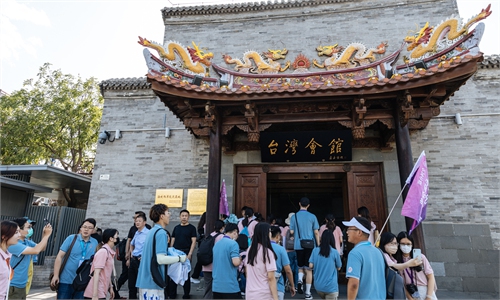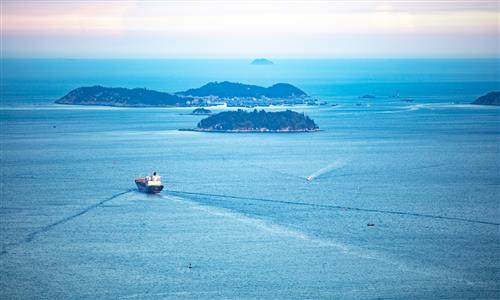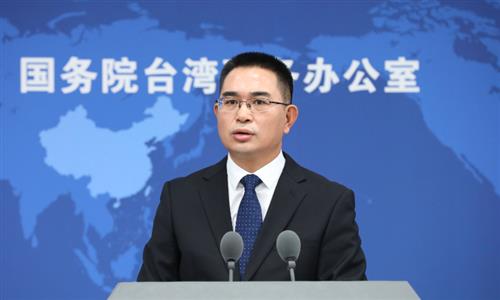Chinese mainland issues sweeping plan to boost integrated development with Taiwan region

This aerial photo taken in Xiamen, Fujian Province on June 5, 2023 shows the view of Kinmen county, Taiwan island. Photo: VCG
Chinese mainland authorities have released sweeping guidelines to support East China's Fujian Province in exploring new paths for cross-Straits integrated development, outlining a flurry of specific measures to boost economic and trade cooperation between Fujian and Taiwan region in a wide range of areas from services trade and small businesses to high-tech industrial clusters.Many Taiwan entrepreneurs on Tuesday hailed the new measures as concrete steps to help businesses from the island to further explore and expand in the mainland, stressing the cross-Straits integrated development is an irreversible trend. Some Taiwan entrepreneurs also expressed doubt about the Democratic Progressive Party's (DPP) willingness and ability to develop the regional economy.
Analysts also said that the move fully demonstrated the mainland's goodwill in supporting Taiwan's regional economy and Taiwan compatriots' livelihoods, in stark contrast to the DPP authorities' secessionist rhetoric and actions, which run counter to the development interests of the region. More importantly, if the DPP authorities continue to pursue secessionist actions and jeopardize cross-Straits cooperation, the mainland will take firm actions in response, analysts noted.
On Tuesday, the Ministry of Commerce (MOFCOM) said that after the mainland suspended preferential tariffs on 12 chemicals from Taiwan under the Economic Cooperation Framework Agreement (ECFA), in response to the DPP authorities' restrictions on mainland exports, the DPP has not taken any effective measures to lift those restrictions and has instead tried political manipulation.
Currently, relevant departments are studying to further suspend preferential tariffs and take other measures on fishery, machinery, auto parts, textile and other products in line with the ECFA, the MOFCOM said.
In a circular made public on Monday, the Ministry of Commerce, the Taiwan Work Office of the Communist Party of China (CPC) Central Committee, the National Development and Reform Commission and the Ministry of Industry and Information Technology outlined 14 measures in five economic and trade areas, including supporting Fujian's opening-up and cooperation with Taiwan, high-quality trade and integrated industrial development.
Specifically, the circular said that Fujian will explore and establish an institutional system and regulatory model that is conducive to advancing cross-Straits integrated development. Efforts will be made to attract Taiwan petrochemical, textile, machinery, cosmetics and other industry projects to Fujian, and help them explore international markets under the Regional Comprehensive Economic Cooperation, or RCEP, a regional trade agreement among 15 Asia Pacific countries includes the ASEAN members, China, Japan, South Korea, Australia and New Zealand.
According to the guidelines, measures will be taken to support micro and small businesses from Taiwan to explore the mainland market. Efforts will also be made to support Taiwan businesses' in participating in the new industrialization process and guiding them to invest in advanced manufacturing and high-tech industries. Fujian will also leverage its advantages in the digital economy, integrated circuit (IC), new energy, lithium battery, petrochemical, textile and other sectors to build a Fujian-Taiwan industrial clusters with global competitiveness. Notably, Fujian will build a cross-Straits IC industrial cooperation pilot zone.
The guidelines come after the CPC Central Committee and the State Council announced in September 2023 that Fujian will be built into a demonstration zone for the integrated development across the Taiwan Straits, in a move aimed at deepening integrated development in all fields and advancing the peaceful reunification of the country.
Coming as the DPP authorities on the island continue to hype secessionist rhetoric ahead of the election of regional leader, the concrete measures offered much-needed assurance for Taiwan businesses and boosted their confidence in future cross-Straits economic and trade cooperation despite noise from the DPP authorities and some in the West.
Boosting confidence
"This new circular will be of great boost to [Taiwan's] future exchanges and development with Fujian and will support more Taiwan businesses to invest in Fujian," Lai Cheng-i, chairman of the General Chamber of Commerce of the Taiwan island, told the Global Times on Tuesday, noting that industrial cooperation in areas such as services and semiconductors will be boosted.
Lai said that all businesses from around the world, including those from Taiwan region, seek to enter the mainland market given its massive size. "I think Taiwan's business community is looking forward to continued positive development across the Taiwan Straits. This is the general trend."
Teng Tai-Hsien, secretary general of Straits Economic & Cultural Interchange Association, also said that Fujian has offered Taiwan compatriots equal treatment in both living and investing, which is "very attractive" to Taiwan compatriots.
"I think the industrial integration and cooperation between Taiwan and Fujian will likely surpass other regions in the future, and the future prospects are promising," Teng told the Global Times on Tuesday.
Following the announcement of the establishment of Fujian as a demonstration zone for the integrated development across the Taiwan Straits, mainland authorities have taken a slew of measures to support that. In November, the Ministry of Public Security's exit and entry administration announced new entry-exit policies for Taiwan compatriots, including streamlining the application process for travel passes.
"With support from so many mainland government departments, these measures also demonstrate the mainland's unswerving efforts to promote the integrated development of cross-Straits economic and trade cooperation and its goodwill toward Taiwan compatriots," Wang Jianmin, a senior cross-Straits expert at Minnan Normal University in Fujian, told the Global Times on Tuesday.
Wang said that in stark contrast to the mainland's goodwill, the DPP authorities have only been interfering, disrupting and undermining cross-Straits economic and trade cooperation, which will only squeeze the space for cross-Straits cooperation and directly harm the vital interests of Taiwan compatriots.
In addition to its secessionist words and deeds, the DPP authorities have been trying to cut cross-Straits economic and trade ties, while disregarding provisions in the Economic Cooperation Framework Agreement (ECFA) between the mainland and the island. DPP authorities have imposed restrictions on more than 2,500 mainland products. In a firm response, the mainland suspended preferential tariffs under the ECFA on a dozen chemical products from Taiwan starting on January 1.
Analysts said the mainland has made it clear that it would firmly counter the DPP's actions that undermine cross-Straits cooperation and hurt the vital interests of Taiwan compatriots, while at the same time taken favorable policies to boost cross-Straits integrated development and support Taiwan compatriots.
"I think the mainland's policies fully reflect its goodwill toward Taiwan. They are not what some in Taiwan claim to be 'trade barriers' aimed at sanctioning Taiwan," Zhang Wensheng, deputy dean of the Taiwan Research Institute at Xiamen University, told the Global Times on Tuesday. "The mainland has always maintained goodwill toward Taiwan compatriots and also hopes that Taiwan compatriots would treat Fujian as their home."




